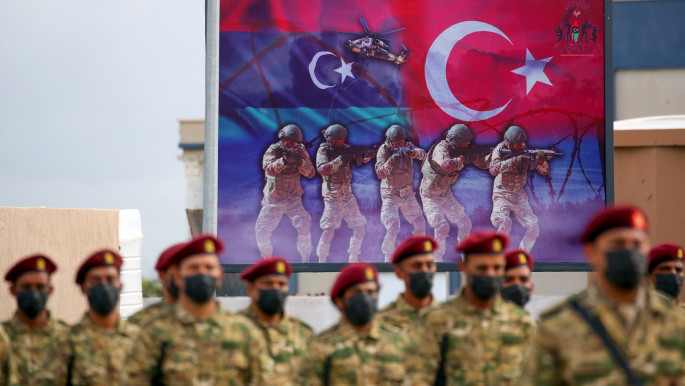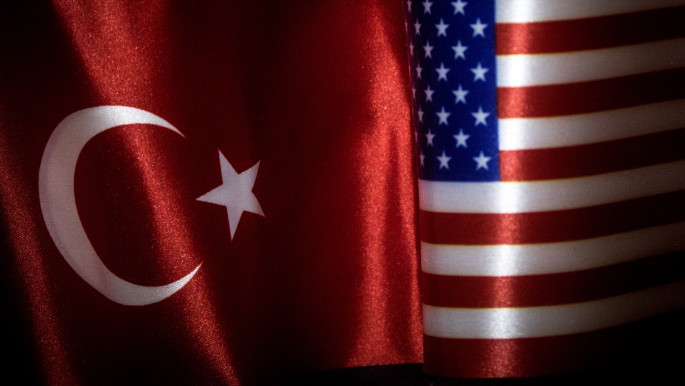Why Turkey wants Biden to salvage the Iran nuclear deal
Meanwhile, Turkey has not only steadfastly supported the Joint Comprehensive Plan of Action (JCPOA) but was also critical of former US president Donald Trump's approach toward Iran.
Thus, Turkey - unlike other regional states such as Saudi Arabia, the United Arab Emirates (UAE) and Israel - would likely welcome the Biden administration shifting away from "maximum pressure" on Tehran to "maximum diplomacy" in order to salvage the Iranian nuclear accord.
As Ankara adjusts to the new US leadership, Turkish officials will certainly miss some aspects of Trump's transactional and haphazard approach toward regional politics, which benefitted Turkey in certain ways.
Biden's predecessor gave Turkey a freer hand, enabling Ankara to pursue an increasingly bold and ambitious foreign policy throughout the wider Islamic world. Turkey's military campaigns against PKK-linked militias in northern Syria and northern Iraq, direct intervention in Libya, and Ankara's role in the 2020 Nagorno-Karabakh war were all cases in point.
 |
Turkey would likely welcome the Biden administration shifting away from 'maximum pressure' on Tehran to 'maximum diplomacy' |  |
Nonetheless, when it came to the JCPOA, Erdogan's government did not see eye to eye with the Trump administration. In fact, in May 2018, when Trump unilaterally pulled Washington out of the nuclear accord, Turkey's foreign ministry called the US withdrawal from the agreement "an unfortunate step."
Furthermore, after speaking to Iranian President Hassan Rouhani, Erdogan reaffirmed Ankara's support for the nuclear deal and told CNN that "we don't need new crises in the region" while warning that Trump's move could come with global repercussions. Indeed, Trump's "maximum pressure" campaign against Iran negatively impacted Turkey and fuelled some tension between Washington and Ankara.
 |
|
| Read more: How does Biden view Turkey's role in Libya's uncertain future? |
Although in the past Turkish and Iranian businessmen and front companies helped Tehran to bypass US sanctions, in November 2019 the US Justice Department escalated pressure on Turkey by filing charges against Halkbank (Turkey's second largest bank) for helping Iran evade sanctions.
Reports indicate that the Iranian businessman Reza Zarrab, who was at the centre of the scheme, had also donated money to a charity belonging to Erdogan's wife. In this vein, Turkey's president viewed the US investigation as a "personal liability" for himself.
More recently, a US judge dismissed another case against Halkbank, brought by 876 plaintiffs who claimed to be the "victims of an overseas terrorist attack committed by a group linked to Iran."
Ankara sees the JCPOA as important for promoting regional peace and economic development. One should not dismiss the critical fact that rising tensions and a potential military conflict involving Iran would severely harm Turkey's national security interests. Given that Iran and Turkey are neighbours with deep cultural, historic, economic, and ethnic links, a large-scale military conflict could not spare Turkey.
 |
Trump's transactional and haphazard approach toward regional politics benefitted Turkey in certain ways, but when it came to the JCPOA Erdogan's government did not see eye to eye with his administration |  |
In the aftermath of the Qasem Soleimani assassination of early 2020, which escalated US-Iran brinkmanship, the Turkish foreign ministry issued a statement noting that the killing would "increase insecurity and instability in the region".
Erdogan cautioned that "Soleimani is an individual who proved himself and one who was accorded extraordinary value by Ayatollah Ali Khamenei…I believe that the killing of a state's commander cannot go unanswered. The choice that [the United States] made was ill advised and has increased tensions."
Notwithstanding its opposition to Trump's "maximum pressure" campaign on Iran, Ankara agrees with Washington that Tehran too often plays a destabilising role throughout the region. In this context, the Turkish leadership finds Iranian support for certain militias in Iraq, Syria, Lebanon, and Yemen to be harmful to the region. In 2015, for example, Erdogan accused Iran of trying to "dominate the region," expressing his frustration with Iran's Middle East policy.
In essence, Turkey, like much of the region, holds that Tehran should fundamentally change major aspects of its regional foreign policy although this is unlikely to occur in the near-term future. Furthermore, in December 2020, Iran and Turkey briefly entered a war of words after Erdogan allegedly recited a poem suggesting that Iran's northwestern provinces belong to Azerbaijan.
 |
|
| Read more: Sinjar and the Turkey-Iran rift in Iraq: A perilous moment for Russia |
Indeed, when it came to Syria and the Nagorno-Karabakh war of 2020, Turkey and Iran have been opposing stakeholders. Also, in Iraq, the Turkish leadership is unsettled by Iranian-backed Shia militias finding common cause with the PKK against the Turkish Armed Forces amid Operation Claw-Eagle 2, which kicked off on 10 February. In recent months, Turkey's efforts to warm up to Israel and Muhammad Reza Naserzadeh's arrest have also harmed the Ankara-Tehran relationship.
That said, Ankara and Tehran appear committed to preventing their relationship from deteriorating over these various issues. On 19 March, Iran's foreign minister Mohammad Javad Zarif visited Istanbul for talks with his Turkish counterpart Mevlüt Çavuşoğlu and Turkey's spy chief Hakan Fidan about various dossiers including Afghanistan, Iraq, Syria, and the PKK. From Istanbul, Tehran's chief diplomat tweeted a photo of him with Çavuşoğlu, whom he referred to as his "brother", proclaiming that Iran and Turkey's "ultimate aim" is to apply "experience of 400 [years] of peace to our region."
It is a safe bet that if Biden takes the proper steps to salvage the Iranian nuclear deal, Turkey will provide the US president with steadfast support. On 21 February, Erdogan called the Biden administration's approach toward Iran a "window of opportunity" while expressing his view that a US return to the JCPOA is the "most reasonable course of action."
Again, on 4 March, the Turkish head of state reiterated his position that a removal of Washington's sanctions on Tehran over the Islamic Republic's nuclear activities and the US's return to the JCPOA would bode positively for stability and prosperity in the Middle East.
 |
It is a safe bet that if Biden takes the proper steps to salvage the Iranian nuclear deal, Turkey will provide the US president with steadfast support |  |
Nonetheless, given the extent to which a host of problematic issues are fueling tensions between Washington and Ankara, it seems difficult to imagine Turkey playing any major bridging role between the US and Iran. Meanwhile, Washington's close relations with Qatar and Oman puts these two Arab states in a better position than Turkey to facilitate a new understanding between the US and Iran vis-à-vis the JCPOA.
With the lifting of the blockade of Qatar in January, Doha has expressed its desire to serve as a diplomatic bridge between Washington and Tehran. Based on Doha's history as a regional mediator, the Qataris may be in a strong position to serve this role. Oman, which was a critical actor in the JCPOA talks during Obama's era, remains a "neutral" player in the US-Iran standoff that has also stressed its commitment to facilitating talks between Washington and Tehran at any moment.
 |
|
| Read also: Why rumours of a Biden-Erdogan showdown are greatly exaggerated |
Therefore, Turkey's role in facilitating a US return to the Iranian nuclear accord will mostly entail Ankara lending its support to Doha and/or Muscat's diplomatic efforts. Early on in Biden's presidency, Çavuşoğlu spoke in favor of Doha as potential facilitator of dialogue between Washington and Tehran.
"The tensions we experienced over the previous US administration withdrawing from the nuclear deal, and the embargoes, impacted the entire region," asserted Çavuşoğlu on 11 February while at a press conference with Qatar's Foreign Minister Sheikh Mohammed bin Abdulrahman Al-Thani. "On this issue, especially as Turkey and Qatar, we can provide contributions, and we discussed these."
Ultimately, Turkey would find itself a winner from a restoration of the JCPOA, particularly considering the positive implications for Turkey's economy from the standpoint of energy, trade, and tourism. Hence, one should expect a growing division in the Middle East between Washington's partners that favour a US return to the deal, and those which stand against any effort by the Biden administration to salvage the accord.
Turkey, along with Qatar, Oman, Kuwait, Jordan, and Iraq, will stand firmly in the camp of states that see the JCPOA's survival as serving not only their own national interests but those of regional and global stability too.
Giorgio Cafiero is the CEO of Gulf State Analytics, a Washington, DC-based geopolitical risk consultancy. Follow him on Twitter: @GiorgioCafiero
Sina Azodi is a PhD candidate in International Affairs at the University of South Florida and a Foreign Policy Advisor at Gulf State Analytics. Follow him on Twitter: @Azodiac83





 Follow the Middle East's top stories in English at The New Arab on Google News
Follow the Middle East's top stories in English at The New Arab on Google News


